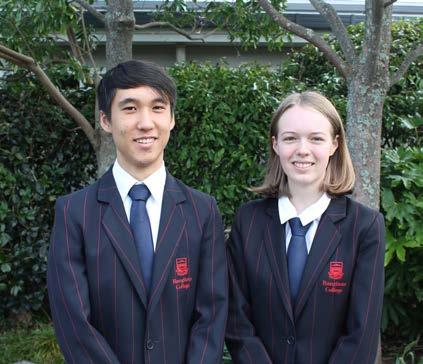
17 minute read
Social Science
by Benefitz
Despite the challenges of Covid-19, the Social Science Department achieved their best ever results in the NZQA Scholarship Exams earning a combined 40 Scholarships across History, Geography, Art History, and Classical Studies. Highlights of these results were the achievements of 2020 Dux, Friedrieke Voit, who topped the country in Art History for the second year running, and the exceptional results of Year 12 student, Cameron Senior, who achieved Scholarship in Art History and an Outstanding Scholarship in History. Congratulations must go to all students who gained Scholarship and their hardworking and dedicated teachers.
Regardless of the odd lockdown here and there, 2021 has been an extremely successful year for the Social Science Department. Along with scholarship, the department has been able to extend all students inside and outside the classroom and truly embody the college’s mission statement of great opportunities, great students.
Junior Social Science
Our Year 9 cohort has had a fantastic first year at Rangitoto College in the Junior Social Science subject. The Year 9 Junior Social Science course introduced students to a wide range of topics to develop an understanding of the culturally diverse and interdependent world we live in.
Students started the year by learning about how and why people move around the globe, followed by learning about several environmental challenges our world faces, with a specific focus on three significant natural resources: water, oil, and native wildlife. Students then moved on to looking at the development in Asia and enjoyed learning about the K-pop and Bollywood industries and how these innovations have impacted their respective economies. Lastly, students ended the year by looking at systems of government, including a focus on women and Māori rights to vote, and North Korea.
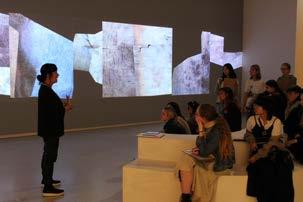
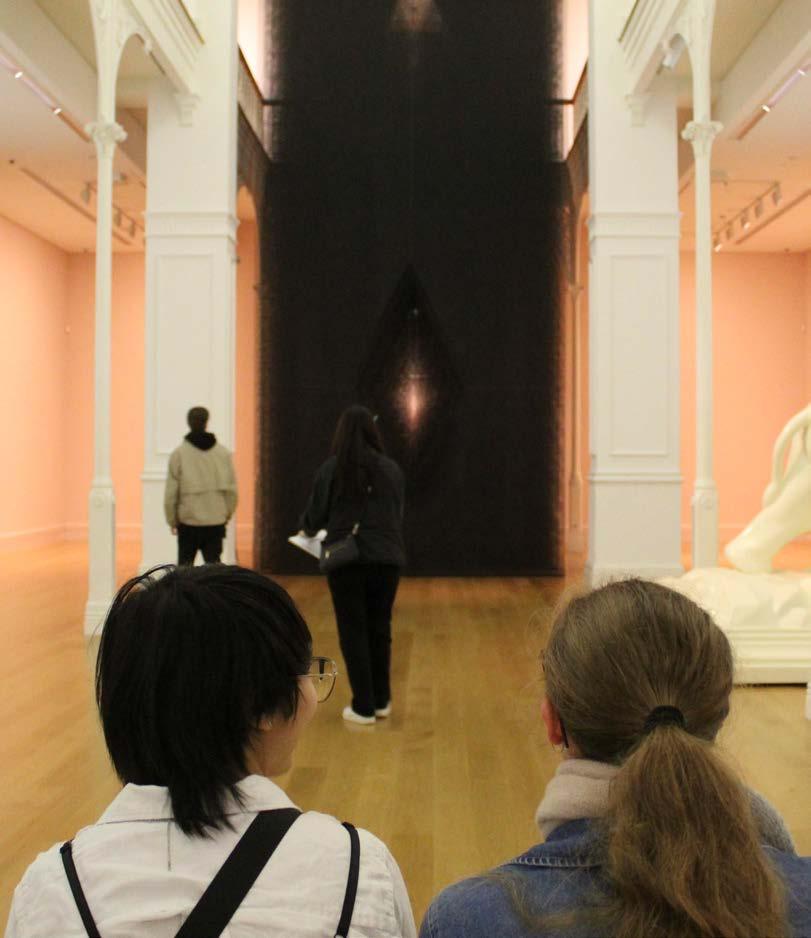
Art History
2021 was an exciting year for Art History. In Year 12, students began the year looking at the turbulent history of France in the 18th century and the beginnings of art as propaganda during the 1789 French Revolution. This was a real highlight for students who loved engaging in History, as it introduced them to the different functions and importance of art in reflecting its own time. A student commented that they “really enjoyed studying how art responds to its time” and that they “felt a strong connection with the context because I can see the influences of the time period on a physical canvas.” By the time they had examined the changes of 19th century France and the modernisation of Paris in the mid-19th century, students had learnt to connect more closely to cities and societies that they had never approached before and this was a real highlight for many of them.
In Year 13, the students learned all about High Renaissance and Mannerist art in Italy. Beginning the year looking at Florence and moving onto Rome and Venice, the Year 13 course allowed students to gain an in-depth understanding of differences between regions and histories of this time in Italy and wider Europe. The Renaissance course exposed students to art and societies both big and small; from learning about the personal family lives of patrons and the “scandalous secrets of the bourgeois” in Italy, to studying the grand projects like the Sistine Chapel ceiling that continue to awe audiences today. For many students, this was a great opportunity to look at the Italian Masters and find out how they became great trail blazers in the world of Art History,

At both year levels students had a chance to go on a trip to the Auckland Art Gallery. A highlight at the beginning of the year was experiencing the ‘Toi Tū Toi Ora: Contemporary Māori Art’ exhibition which was the largest exhibition in the 132-year history of Auckland Art Gallery Toi o Tāmaki. Year 13 students followed this in June with a trip to see the ‘All That is Solid is Melts’ exhibition which combined contemporary and historical collections across Aotearoa and worldwide.
The art history world has seen many changes in the last decade and in particular the last couple of years. This was reflected in Scholarship Art History which was another highlight for many students who wanted to examine Art History from a wider perspective outside of class. For many students, scholarship offered a unique insight into the history, societies, and art they had never been exposed to and allowed them to consider significant themes through the history of art such as conflict, debate, controversy, and beauty. The Scholarship Art History programme remains a real strength for Art History students and continues to grow every year.

Classical Studies
The influence of the ancient Greeks and Romans filters its way into our everyday life. From our democratic system of government, our judicial processes, our language, and our art and architecture, a sliver of the Greeks and Romans always remains. The classical world has inspired generations throughout history; from Renaissance master Michelangelo to French Emperor Napoleon Bonaparte; from Elizabethan dramatist to the creator of Harry’s Magical World, J.K. Rowling.
Classical Studies offers students a window into the lives of the Greeks and Romans, with a focus on the literature, religion, philosophy, history, art history, political studies, and language of these two civilisations. This requires students to adapt their skills in interpretating sources of evidence and pieces of art, analysing the validity of primary and secondary source evidence and crafting argumentative essays.
In Year 12, students start the year looking at a range of significant historical events like the Persian Wars of the 5th Century BCE through to the destruction of cities like Pompeii and Herculaneum by Mount Vesuvius in 79 CE. The focus then shifts to Homer’s epic poem The Odyssey where students learn about the relationship between Odysseus’ Homeric characteristics and those of modern heroes, like Aragorn, Black Panther and Harry Potter. After this, students examine the intricacies of the art and architecture of Ancient Rome and the role they played in creating an Empire.
In Year 13, students start the year studying Aristophanes, the Father of Comedy. The introduction into Level 3 Classical Studies begins with an elderly man attempting to escape his house attached to the underside of a donkey, which sets the tone for a year of strange yet brilliant classical stories. We then shift our focus to Rome, studying the reign of Rome’s first emperor Augustus, examining the significant role he played in shaping the socio-political life of Imperial Rome. Students will end the year with extensive knowledge of how the Roman Empire, as we know it today, was formed as the result of a series of careful manoeuvres by the Master of Propaganda—Augustus.
Geography

Geography at Rangitoto College for 2021 has been an intense year filled with field trips, assessments, and learning all about the people and the environments that they live in.
In Year 11, students started the year learning about the contemporary geographic issue of E-Scooters. E-scooters are a geographic issue as they were originally brought in to allow people greater access around metropolitan areas but now have become an environmental and social hazard with high costs associated with injuries and dumping of them in waterways. Following on from E-scooters, students travelled out to Piha to complete geographic research on the Piha Stream. Students were tracking if the width of Piha Stream increased or decreased the closer to the river mouth students travelled. Students really enjoyed this trip and being out in the field gathering data, “I felt like a real geographer!” said one student. Students then completed an internal assessment looking at the global pattern of earthquakes. This was particularly interesting because New Zealand sits on the Pacific Ring of Fire and students were able to use both national and international examples (including Haiti which, sadly, has just been struck by another powerful quake) in their work. Building on the earthquake topic was the final internal assessment that looked at a new volcano appearing in Auckland. This new volcano would bring natural effects to Auckland that would then bring economic and social impacts. Students completed this internal by using Google Earth Pro, to give students a taste of using Geographic Information Systems (GIS) to solve geographic problems and how to present data using this tool also. Finally, students focused on the Indian Ocean Tsunami for their final external exam. This extreme natural event even though it happened in 2004 is still studied today as it resulted in the way that tsunamis are tracked changing forever and the sheer scale of the event changed people’s lives globally forever. Overall, Level 1 has given students a solid understanding of the world around them on a local, national, and global scale as well as preparing them for Level 2.
Year 12 students started the year focusing on geographic research. Students travelled down to Tongariro National Park for three days to complete the crossing while gathering data. This allowed students to select their own aim to gather data that interested them, with the theme of alpine zonation. Tazanna Dell said, “I am very proud to say that this subject made me climb a mountain.” This trip challenges students physically and mentally but the sense of accomplishment both academically and physically means the trip continues every year. Students then studied freedom camping, which was dynamic this year due to the borders being closed and freedom camping having a more domestic focus. Students then moved to a global focus and looked at the global pattern of coffee production and the impacts on people of this industry that is second only to oil in the world commodity trade. Students were challenged to think about where and what coffee they buy and to become ethical consumers. We then went local and looked at the temporal pattern of Auckland’s population growth. This internal had both historical and contemporary data and allowed students to understand why Auckland is structured the way it is. Finally, students are using their knowledge of natural processes to examine the Amazon drainage basin for the external exam. This standard uses knowledge from Level 1 and the start of Level 2. A final quote to summarize Year 12: “This subject has not only fuelled my curiosity for our world but given me amazing experiences and helped me reach my potential as a proud Geography student”.
Year 13, the third and final year of the Geography programme. Students started the year with an American focus, looking at gun control in America and potential courses of action for the future. Students then had a global focus on looking at maritime piracy as a global pattern and the impacts on people socially and economically because of this problem. This is a very interesting topic and complex in nature due to the cause of the problem and the underlying poverty that was exposed. Students then travelled down to Rotorua for the long-awaited three day trip to study the cultural processes of tourism development. This trip allowed students to immerse themselves in the environment to understand how the process operates and to also look at the impacts. This year, the trip was very interesting as Covid-19 had changed the cultural process to a large extent and resulted in students visiting different attractions than the trip normally does. Finally, students studied what is considered a rite of passage for young people, the Rhythm and Vines Festival. Students use this assessment to study and evaluate the planning and success of the event through a geographic lens. Students complete the year with the focus on the case study of Rotorua and the cultural process of tourism development. Geography prides itself on preparing our students for university, and we wish all our students’ great success in the future.
Geography scholarship and extension courses for 2021 have focused on inequalities within and between countries. Students have been attending Tuesday morning sessions to learn content with Miss O’Brien and the Geography Department. Mrs Reddy has been running lunchtime sessions on how to approach the exam. Students in 11 and 12 extension classes and 13 scholarship classes have had the knowledge and content integrated into their courses. Students complete nightly readings and then gather evidence to ultimately establish their knowledge base so that scholarship skills and knowledge becomes second nature to the students.
One student, Kaia Buckley, has summarised the course in the following words, “Extension Geography offers you many advantages which will hugely benefit your learning. Being in Extension Geography you are able to have a wider knowledge as you learn from the ones that you are surrounded by through sharing ideas. As well as having a wider knowledge on the topic, the environment of the classroom is so much better than what you would usually have this is because everyone is in the same boat and eager to learn more giving a quiet hard working mind-set type of classroom.”
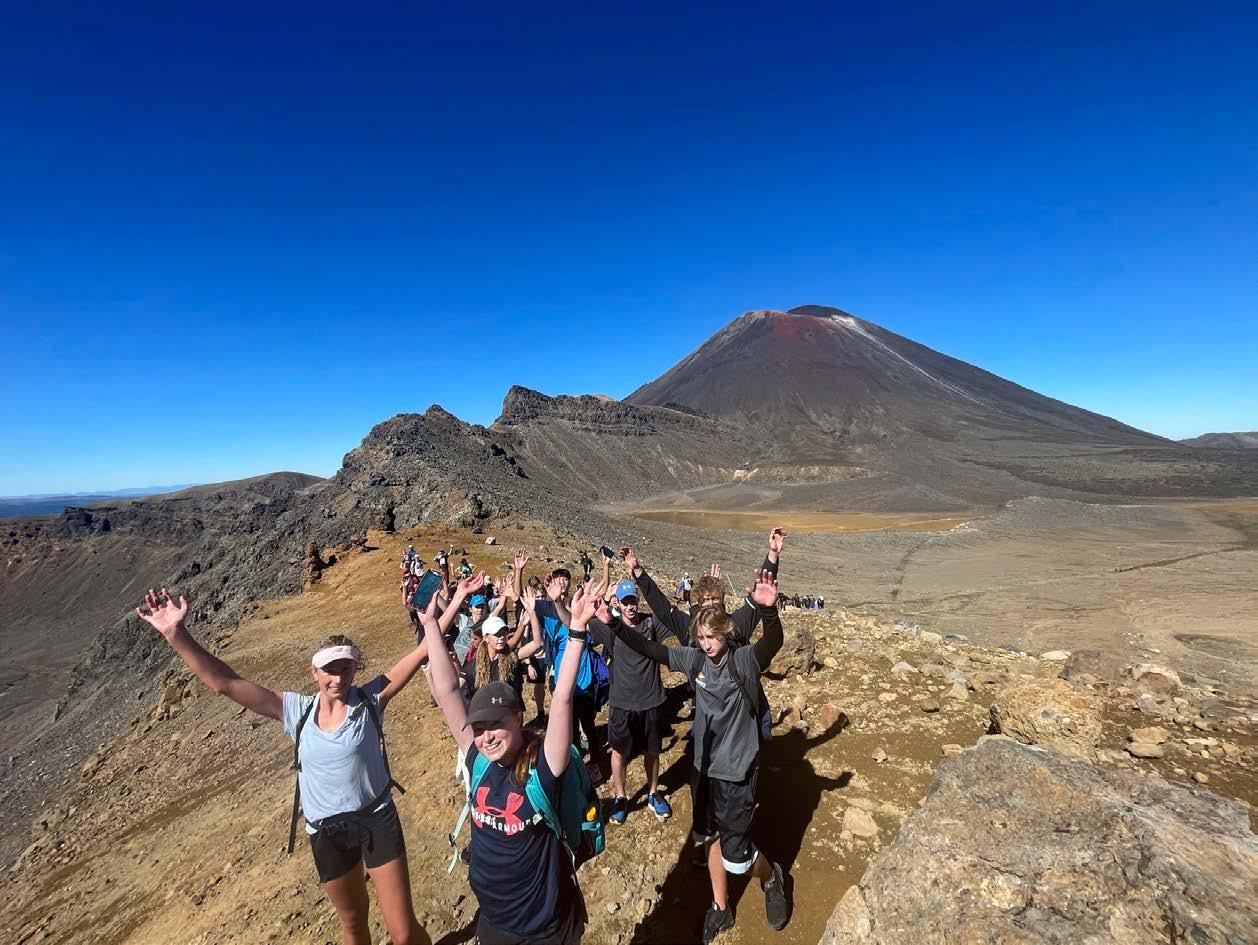
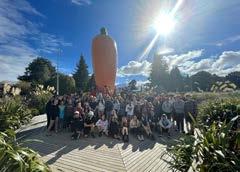
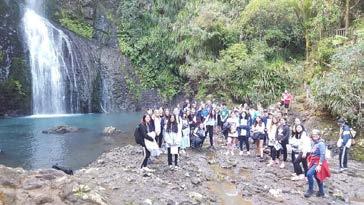
History
Martin Luther King Jr. is quoted as saying, “We are not makers of history. We are made by history”. This year, students have studied a range of subjects that have shaped the world we live in. A particularly relevant topic has been the 2021 scholarship topic which was ‘colonialism’ with a focus on New Zealand in the year 1900. Through this lens, students have been able to study a range of empires and the legacy they have left behind through colonisation.
The Year 11 History classes were fortunate to visit the Auckland War Memorial Museum to conduct research on a topic related to the Great War. Topics included the role of women, Māori, and a range of battles that New Zealand participated in. The Year 11 History classes have enjoyed learning about relevant issues from the 20th century. Investigations into the perspectives of the Black Civil Rights movement in America saw students delve into rich and raw social histories of the not too distant past. The rise of Hitler, and the consequences of this, proved just as interesting in challenging students’ perceptions of the past.

The Year 12 classes have had a focus on colonisation and its consequences this year. The Vietnam War was the focus for Term 1, with students studying the impact of French and Japanese occupation of Vietnam and the subsequent civil war that followed. We were very lucky to have our Vietnam War veteran, Brian, visit us again and entertain us with his stories and experiences during this conflict. On top of this topic, classes have studied either colonisation in Australia or the Rwandan Genocide. A highlight of the year was the trip to the Bay of Islands. Students used this as an opportunity to gather evidence on the early colonisation of New Zealand by visiting sites such as Ruapekapeka, the Stone House, the Waitangi Treaty grounds, and much more.

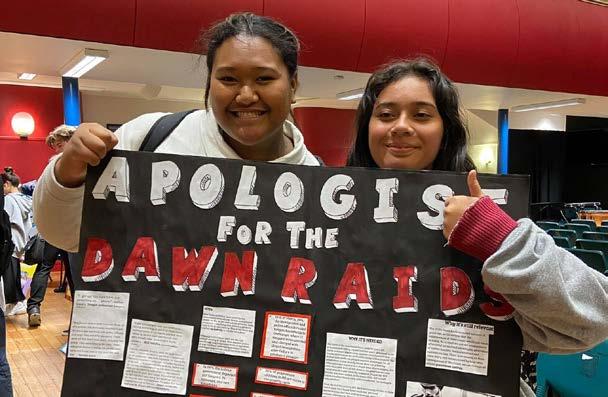
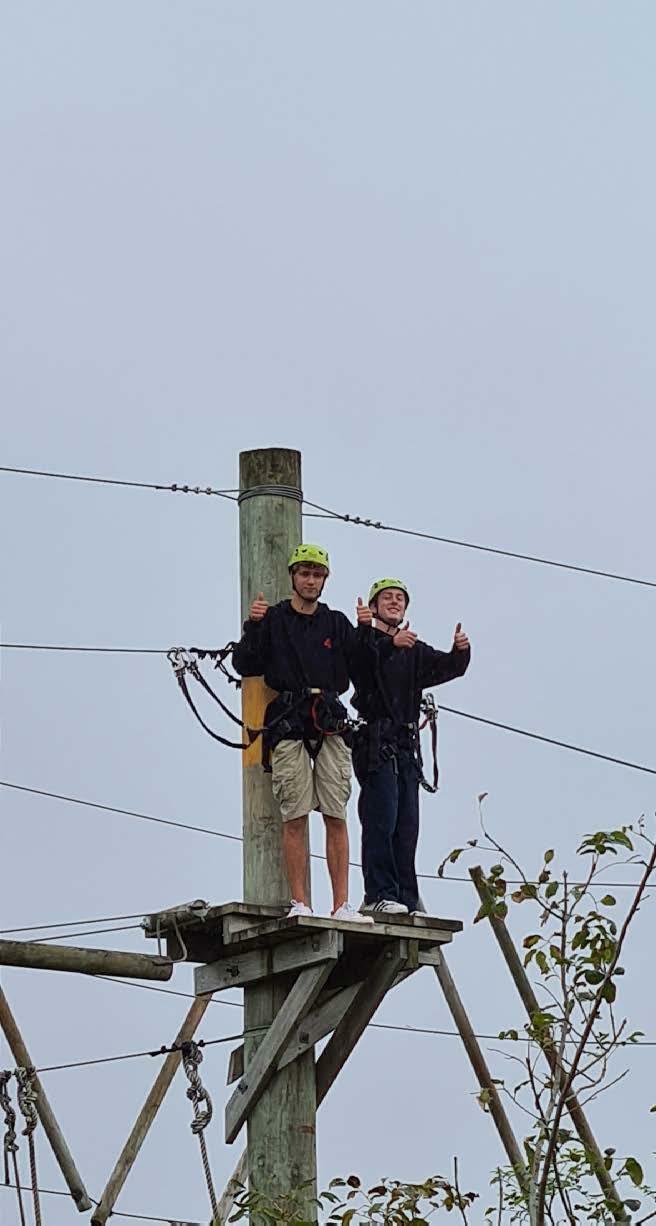

2021 has been a great year for Social Science Internal. Students have formed some great friendships and had a lot of positive moments. Beginning the year by exploring an Aotearoa based social issue, students examined topics such as poverty, homelessness, and gangs. Term 1 also saw us go into learning from home, which tested our self-management skills. Term 2 allowed us to enhance our ability to gather information from documents and understand the importance of using internet in the workplace. We also took a closer look at the Cambodia house building trip that has been carried out by the College in previous years. The second half of the year gave students the opportunity to experience Level 1 Geography as a subject and carry out some field research as well as work together as a team to plan an event for staff. Together, students have learnt teamwork, planning, and communication skills.
Sociology
Sociology gives students an opportunity to investigate the world around them and empowers them to make a positive impact on it. At Level 2, the sociologists studied human rights actions as well as global conflicts and those happening in Aotearoa. Subjects explored included socialization, the 40 Hour Famine, New Zealand’s 2020 referendum, and the discrimination faced by the Uyghurs. The cohort also worked collaboratively in their classes to support an array of charities, including Shine, Foster Hope, and Auckland City Mission. At Level 3, the course covers criminology, the Israel Palestine conflict, and inspiring youth-led social action. Year 13 Sociology students also had the exciting opportunity to complete policy-focused social actions which included writing letters to Members of Parliament, educating their peers, and taking part in our annual social action expo.


Tourism
Tourism at Rangitoto College ensures that students are well prepared for a future in one of New Zealand’s largest industries. Despite the current climate of the tourism Industry, students are still in demand at tertiary training institutes and New Zealand tourism business across the country.
Year 12 Tourism students learn about how the tourism industry works, from the history of travel and travel businesses, to world and New Zealand destinations. The Industry Day field trip for Level 2 to the New Zealand School of Tourism Airport Campus and Rocket Ropes teaches students about work roles within tourism and fosters teamwork. These are all important components of the Level 2 Tourism course and will set them up well for Level 3.
Tourism in Year 13 focuses on destinations, such as Australia, the Pacific Islands, and specific regions within New Zealand. The last unit of the year teaches students about the economic impact tourism has on people and places, where they are encouraged to draw from their learning from the year. Level 3 Tourism is also a place where students put the skills they learned from Level 2 into practice. Over the course of the year, students must give presentations about New Zealand regions, as well as complete a group presentation project based on Australia. The Year 13 field trip to the Sir Peter Blake Marine Education and Recreation Centre was designed to build on their teamwork skills, which will aid them in future group projects, as well as explore the physical impacts tourism may have on New Zealand.
Tourism regularly offers opportunities for students to learn about what tourism has to offer after high school. This year we have had a visit from the prestigious Queenstown Resort College and a very informative session with Go With Tourism. Go With Tourism is a government-funded initiative and is launching a programme designed to educate our youth about the wide range of career pathways available in the tourism industry. Our Year 13 students had a visit from Auckland Skydive as well. This is not only a skydiving business for thrill seeking tourists, it is also an NZQA accredited sky diving school—the only one of its kind in the southern hemisphere. They discuss what a course at Auckland Skydive entails, from the jumps to student life. These visits are invaluable to many students who are not sure what their next step is after high school; it is a great way for them to see the variety of opportunities available to them.
Year 13 students started the year off with a world history unit, focusing on the expansion of empires and the impact these have had on the world we live in today. All the topics were well received, and it was fantastic to see our wellrounded Year 13s taking lessons from such diverse topics in our history. The invasion of the Waikato was once again covered this year, with students building on the information they had learnt around empires and analysing the impact the British Empire had on New Zealand. Students were able to go on an overnight field trip to the Waikato to visit places of significance to the land wars.
International Baccalaureate (IB) History has had a great year studying a range of interesting historical topics. They had a bit of fun along the way through interactive learning games and historical event themed escape rooms. The Extended Essay topics included British colonisation of Australia, the impact of US annexation on native Hawaiians, and others. This year the IB History students have studied a wide range of topics including Chinese history, Japanese expansion, Italian expansion, Hitler, Stalin, Mao, and the move to Global War.






